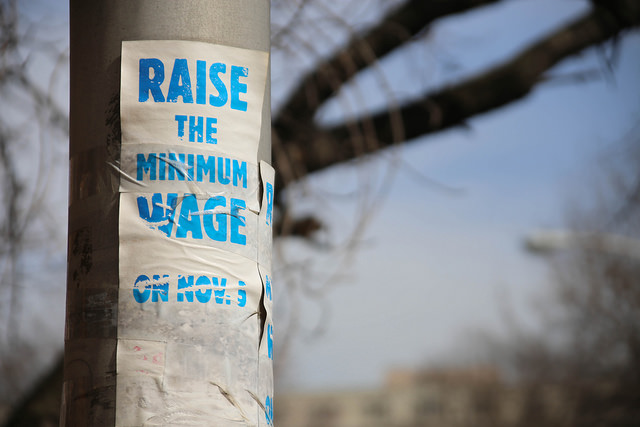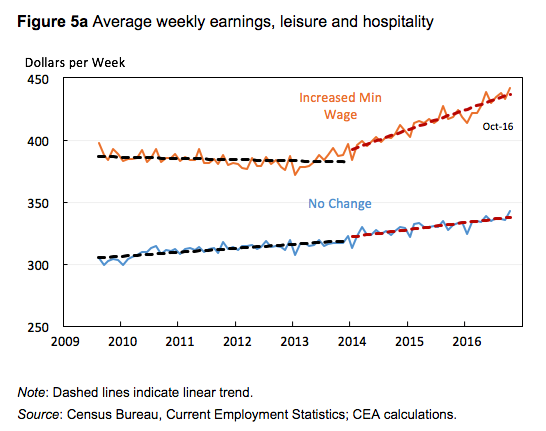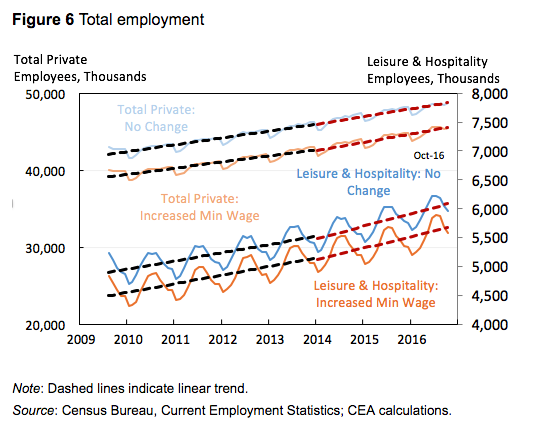Higher minimum wages result in greater earnings for low wage workers, and no loss of jobs
We’re always casting about for effective policies to address poverty. And there’s new evidence that higher minimum wages accomplish just that. In a new review of the literature and data by the President’s Council of Economic Advisers shows that states that raised their local minimum wage generated greater earnings for low wage workers, with apparently no effect on employment levels.

The key argument against raising the minimum wage is that it would somehow cause employers to reduce the hours of work of employees subject to the minimum, and thereby lower the total number of job opportunities. That view was challenged in 1995, when Economists David Card and Alan Krueger published their book on the subject, Myth and Measurement: The New Economics of the Minimum Wage. In a nutshell, Card and Krueger argued that low wage employers effectively acted like “monopsonists” in purchasing low wage labor–that firms had market power that enabled them to pay low wages.
The Council’s report, written by Sandra Black, Jason Furman, Laura Giuliano, and Wilson Powell, uses the policy experiment provided by different state minimum wages to test the income and employment effects of minimum wage increases. It’s available on line at the Center for Economic Policy Research’s Vox — “Minimum wage increases by US states fuelled earnings growth in low-wage jobs.”
Over the past decade, a growing number of cities and states have enacted their own local minimum wages, while most states have minimums that are at, or no higher than the federal minimum wage. The core of the CEA analysis is a look at the differences in trends in worker earnings and employment levels. In the past three years, 18 states and the District of Columbia have enacted higher minimum wages, and the CEA uses these states as a kind of “experimental” group for assessing impacts, compared to a control group of the states that stuck with the unchanged federal minimum wage. They focus on earnings and employment in the accommodation and food services industries (think restaurants and motels) because these industries have a large number of minimum wage workers, and are most likely to be affected by the wage laws.
Earnings rose
The primary objective of the minimum wage increase is to increase worker earnings in low-wage industries. The data clearly show that wages rose faster for workers in the accomodation and food service industries in states that raised the minimum wage than those that didn’t. There’s a pretty clear step-change in the growth rate of wages that’s associated with the minimum wage increase. The following figure shows average weekly earnings for workers in leisure and hospitality in states that raise their minimum wage (orange) and those that didn’t (blue). There was a sharp acceleration in wages in states that did change their minimum wage after 2014, compared to only a very slight acceleration in all other states.

Employment didn’t decrease
The fear is that the higher minimum wage leads to lower employment. The following chart shows employment change for all private jobs and for leisure and hospitality jobs between 2009 and 2016 for states that increased their minimum wage (orange lines) and those that didn’t (blue lines). Dashed lines indicate the growth trend after removing seasonal variation. It’s pretty clear that there was no change in the trend growth of leisure and hospitality jobs in states that increased their minimum wages, and that that jobs in industries subject to the minimum wage grew at about the same rate, relative to overall private job growth, whether or not a state raised its minimum wage.

Increased earnings coupled with no negative impact on employment is a result consistent with the Card and Krueger thesis about market power of low wage employers. As Black and her co-author’s conclude:
In fact, when employers have sufficient market power – so-called monopsony or wage-setting power in the labour market – and can set wages below what would prevail in a perfectly competitive market, there is scope for a higher minimum wage to raise both wages and employment.
Poverty continues to be a difficult and widespread problem. The good news hear is that higher minimum wages are one way to raise the incomes of low income workers, and to do so without damaging overall job prospects.

